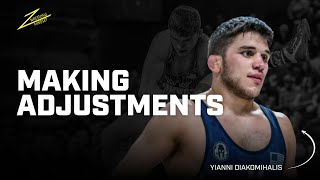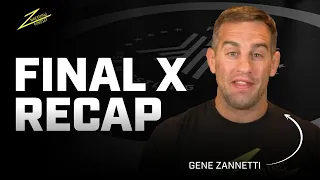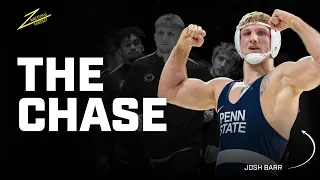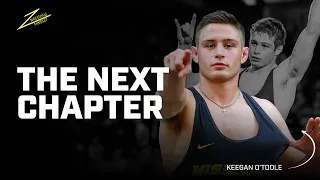Learn
The Secrets of Mental Toughness No One Talks About
How my softest kid got super tough - yours can too...
Pete Jacobson has been a varsity HS coach for almost 20 years. He also works with coaches of all levels through WinSmarter to help them get better at what they do, have a greater impact and go home happy. Check out 10 Insanely Powerful Tactics for an Amazing Team Culture for some of the most unique, impactful tactics you can use to build a Championship culture quickly.
Story time:
I had this freshman kid on my team about 16 years ago who was literally the softest kid I’d ever seen. At least that’s how I thought about it at the time. I coach wrestling, which is a tough sport to begin with, but this kid literally couldn’t make it through a practice without either “getting injured” or crying at some point. To make matters worse, he was the only 103-pounder on our roster that year, so he had the starting spot by default. He didn’t win a single match that year. And when I tell you he didn’t win a single match, what I really mean is that he never even came close. Pinned every time he stepped on the mat – usually in the first period.
It was bad.
For the life of me I couldn’t figure out why this kid was even on my team. Clearly wrestling wasn’t for him. We needed kids who were mentally tough and that was not this kid. He was super passive and seemed to just quit on himself every match. Sophomore year wasn’t much better. He “hurt his finger” early in the season and it was an ongoing excuse the rest of the year.
At the time I told myself I wouldn’t waste much of my time coaching him and honestly hoped he’d just quit to make my life easier. (I’ve since learned my lesson!)
Some kids are mentally tough and some kids aren’t, I thought. You don’t need me to tell you where this kid fell on that scale.
My thoughts at the time weren’t unusual for a young, inexperienced coach. In the usual evolution of coaching, you get a lot of coaches who start out their careers believing that mental toughness if a fixed trait. You have it or you don’t and it’s your job as a coach to figure out how to deal with whatever kids you get in your program.
I was that guy. I didn’t know any better at the time.
Then things started to get interesting.
By the time he was a junior, for whatever reason, things started to slowly shift. He started winning some matches. And then he won some more. By the end of the season he was winning some matches strictly because he refused to quit on himself, even in difficult situations. He ended the season taking 4th in our Sectional Championships.
His senior year was hard to believe looking at where he’d come from. At Sectionals he made it to the finals where he upset the top-seeded kid in overtime. He was unshakable. He was awarded the Most Outstanding Wrestler of our entire Sectional Tournament in any weight class. Despite being unseeded in the State Championships, he went on to place 6th in New York State, again upsetting several ranked wrestlers along the way.
This kid, who was literally “the softest kid I’d ever seen,” had become one of the toughest, grittiest wrestlers I’d ever coached.
It took me a long time to wrap my head around that.
It forced me to realize that obviously mental toughness is not a fixed trait. I didn’t know what I did or what this kid did, but clearly he grew a lot in this area over his high school career.
Here was my next big realization: if it’s possible for kids to become mentally tougher, then it’s something that can be coached.
So what does a still relatively inexperienced coach, armed with this new knowledge, usually do?
I set out to make them tougher.
How did I try to do that?
Well, I figured that if I wanted to make them tougher, I’ve got to make things as tough as possible for them on a daily basis. Run a million sprints. Make practices brutal.
It wasn’t pretty.
I might’ve been making them tougher. I was definitely making them miserable. And miserable kids don’t usually come back next year. What good is it to have three tough kids that stick around if there’s no one else on your roster?
No, my big problem was that I still didn’t understand the “mental” part of mental toughness. So what is mental toughness, exactly, and how you develop it as a coach? Those always seems to be million dollar questions.
What’re the answers?
Well, I’m no expert (although if you’re looking for experts, you’re certainly in the right place at Z Winning Mindset!), but here’s my definition:
Mental toughness is the ability to consistently perform at or close to your highest potential regardless of the situation or circumstances.
Now there’s tons out there on this topic, but instead of rehashing all of that, I wanted to share four strategies you don’t usually hear much about for building tremendous mental toughness on your team as a coach.
While these might not be the conventional ideas you hear in conversations on building mental toughness, I can tell you they’ve all been absolutely huge for us in our program, and they could be in your program too.
Focus on the process
What you choose to talk about and emphasize to your team on a daily basis has huge impact on how tough they’ll become. What you choose not to talk about is just as important.
Check this out: when kids are caught up in whether they win or lose, it’s really easy for them to lose focus on the specific, controllable things they need to do that will have the greatest impact on the outcome.
When it’s all about winning or losing, and that message is coming from others around them, like their coaches, teammates or parents, kids are obviously gonna put a lot of pressure on themselves to win. The problem is, no matter the sport, our kids don’t have 100% control over the outcome. Our opponents and even the referees have a say in the matter. When we’re fully invested in a particular outcome and we don’t have full control over that outcome it causes stress. Too much stress leads to choking and poor performance – the exact opposite of mental toughness.
So what if we changed this up? What if we got our kids putting 100% of their focus on things they could control? In wrestling, for example, that might be on handfighting hard or keeping our feet moving. By focusing on their process – on the things they can control that put them in the best possible position to achieve the outcome they’re looking for, we’re taking away that stress. When we get them to evaluate their success on their process, rather than their outcome, we’re putting control of success back in their hands.
So, as a coach, how do we get our kids to make this shift?
Well for starters, stop talking about winning and losing. Stop talking about how “we need the win today.” Stop talking about how important beating xyz team is. Stop talking about how “this game” means everything. Just stop!
Hey, your kids aren’t stupid. They know all this stuff without you telling them. We’re just adding more fuel on the stress fire by harping on it.
In our program, we literally try to not to talk about winning and losing at all! Not because it’s unimportant – it’s very important! – but because we’ve learned that not talking about it puts us in the best position to actually make it happen.
Remember, also, your non-verbal communication is maybe even more important here than what you say. You can say all the right things, but if your facial expressions, mood, mannerisms and body language still reflect an emphasis on winning, that’s the message your kids will get.
I’m not gonna lie to you, this can be really hard! It takes practice, but I promise you the results will be worth it!
So what can you do to focus more on the process?
- Give your kids specific, process-based cues to focus on in competition – appropriate for your sport, level and position
- In your pregame and postgame talks, focus in on performance, not outcome, and get really specific. Call out kids who’s process was great. Call out kids who did the right thing from a process standpoint and are getting better because of it. Kids that weren’t getting it done – pull them aside and talk to them. For most kids, calling that out in front of the whole team won’t help them perform better next time – it’ll add to their stress level and likely make it worse! Remember: shout praise, but whisper criticism.
- Keep process-based stats, rather than outcome-based stats. We keep a stat sheet on the bulletin board in our locker room, but it doesn’t contain typical wrestling stats like wins, losses, pins or takedowns. Instead it shows our process stats. Things our kids control. Things like making first contact in neutral or moving on the whistle on bottom. What gets measured, gets managed.
Embrace failure
Yep, you read that right. Embrace failure. Perfectionism is one of the most subtle and dangerous enemies of mental toughness you’ll encounter.
Once we get our kids focusing on the process, we still need to get them to accept the fact that their process won’t always be perfect.
Once again, it all comes down to stress impacting performance. When kids feel the need to be perfect, their stress level skyrockets and one of two things happen:
- They choke from the pressure and fall apart, or…
- They’re so concerned with being perfect that they play tight. They play not to make mistakes. They play to not lose. What they don’t do is play with the kind of openness and aggressiveness that we all want to see from our kids when they’re competing at their highest level.
This goes for practice too! After all, we can’t expect them to train one way and then compete a different way on game day. It pays big dividends to start instilling this attitude in practice. Kids improve the fastest when they’re forced to operate at the edges of their ability, to take chances and not play it safe or try to look pretty. If they’re gonna work out at that edge, it’s inevitable they’re going to fail and often it’ll be ugly. As coaches we need to encourage that. We need to call it out. We need to let them know that’s ok and we expect it.
We need to convince our kids that failure is an inevitable stop on the road to success.
We talk to our kids about it before every competition as well. We tell them we expect them to make mistakes and they should expect it too. We tell them that’s ok and just to compete through it. We tell them that if they’re not making mistakes in competition, they’re not being aggressive enough, and that if they’re not making mistakes how will they ever get practice at competing through mistakes and overcoming them.
Failure is a requirement!
And the bottom line is they’re gonna fail one way or another.
My absolute favorite quote that sums this up:
“If you’re not failing regularly, you’re living so far below your potential that you’re failing anyway.”
– Gregg Levoy
Pretty powerful to think about it that way!
Culture of caring
This part is probably the most challenging but also the most important to really get results.
Once again it comes back to stress level and the pressure kids put on themselves. Whether they acknowledge it or not, our kids have the need for approval from their teammates, coaches and parents. There’s a strong psychological urge not to let them down. The default setting for most kids is that their value to these groups is based on their outcomes. That adds a lot of stress and pressure that hurts performance and doesn’t need to be there.
The number one way to counter this and remove these obstacles to high performance is to create a culture of unconditional caring in your program.
I get what some of you are probably thinking, though. Sports are a tough undertaking. We’re trying to create gritty, resilient individuals who compete fearless and aggressively. Talking about things like unconditional caring and self-worth seems almost counter productive. It can seem “soft.” I was there too.
Here’s what I eventually realized: creating this kind of culture is giving our kids the psychological safety net they need in order push themselves to this level.
Put another way: when kids are given the “freedom” of knowing they’ll still be valued members of their team and family, no matter how they play or what the outcome, that additional weight is taken off their shoulders and they can play free, open and fearlessly.
So how do we make this happen?
Focus on each group (coaches, parents and teammates) separately to get them on board with the kind of culture you’re looking to create.
You and your coaching staff are the easiest place to start. You have the most direct control over your own actions and the positive example you create makes it that much easier for everyone else to get on board.
First off, actually care about your kids. I know it sounds simple, but make sure it’s true. Not sure I can teach you how to actually care about someone, but a good question to ask yourself is “Why do you coach, really?” Is it for yourself or for the kids on your team?
Now, let them know you care – early and often. This isn’t the kind of thing you can mention at the beginning of the season and think it’s done. You need to send them this message and reinforce it everyday with your words and your actions.
Let them know that they are not their results. Their value to you and the team isn’t based on whether they win or lose. Their worth doesn’t increase or decrease based on outcomes – they’re loved and valued regardless – unconditionally. Now back that up with your non-verbal communication as well. Don’t change your demeanor with them based on the scoreboard.
Your parents are next. Obviously parents are gonna love their kids unconditionally. The problem is sometimes, when it comes to sports, they don’t do a great job showing it! The three quickest, most high leverage strategies I’ve found to counteract this are:
- Your pre-season parents’ meeting – You’ve got a captive audience here. Make sure you spend a few minutes talking about the best ways parents can support their kids to perform at the highest level. Often it’s asking them to do less talking about performance with their kids! Let them know what great sports parent behaviors look like. We tie our parent expectations back to our core values so they really feel like they’re an integral part of our program as well!
- Reminder emails – After the meeting and occasionally throughout the season, especially before our first competition, we send emails out to our parents reminding them about this stuff. Parents are just like anyone else – the more they hear a message, the more it will sink in. We send out weekly emails to our parents every Sunday so adding these reminders in from time to time is no big deal.
- To make things even easier for our parents (and to help you with some talking points) we print out this awesome post from Z Winning Mindset and use it as a handout at our parents’ meeting.
Your kids are the last and most critical part of the puzzle. Creating an environment of support and caring amongst teammates is SO important to help kids develop a deep level of mental toughness.
Think about it like this: it’s much easier for kids to put themselves out there and play aggressively, without a fear of failure, if they know their teammates have their backs no matter what AND it’s much, much harder to quit on themselves when things do get tough because they don’t want to let down teammates who they care so deeply about.
Creating this culture of caring amongst teammates is a big win for so many reasons.
Here are the top two things I’d think about for getting this done in your program:
- First, lay the foundation: get really clear on your Vision, Philosophy and Core Values in your program. This stuff is the absolute essential baseline from which you can build an amazing culture.
- Once the groundwork is in place, make sure you’re spending time each week to incorporate intentional tactics into your program, specifically designed to build the culture of caring you want. I always get a million questions here on how to make that happen quickly and painlessly, so I’ve got a simple answer. I put together this quick eBook with ten of the most unique, impactful tactics we actually use in my program to create a Championship culture of caring.Get your free copy here and start using these ideas today!
Get your kids a mindset coach
It’s hopefully pretty obvious that helping your kids get their mindset right is a HUGE part of developing mental toughness.
The thing is there aren’t a lot of specific and systematic resources out there to help teach your kids what they need to develop this kind of strong mindset. And there certainly aren’t many opportunities available to give them the intentional reps and practice they need to really develop these mindset skills.
Getting great with your mindset is no different than getting great at any other skill, it takes reps, practice and guidance from an experienced coach.
No matter what your sport, Z Winning Mindset has these exact resources to help your kids conquer the challenges they’ll face.
Whether working with your whole team or one-on-one with individual athletes, their programs have made a huge difference for our wrestlers. Their programs have become an indispensable part of helping us develop tough, resilient and high performing athletes!
You can check out all they have to offer and schedule a free trial session here.
There’s a lot that goes into building mental toughness in your kids, and zeroing in on the right strategies as a coach will save you a ton of time and frustration. Hope this helps get you going in the right direction!
‹ Back








